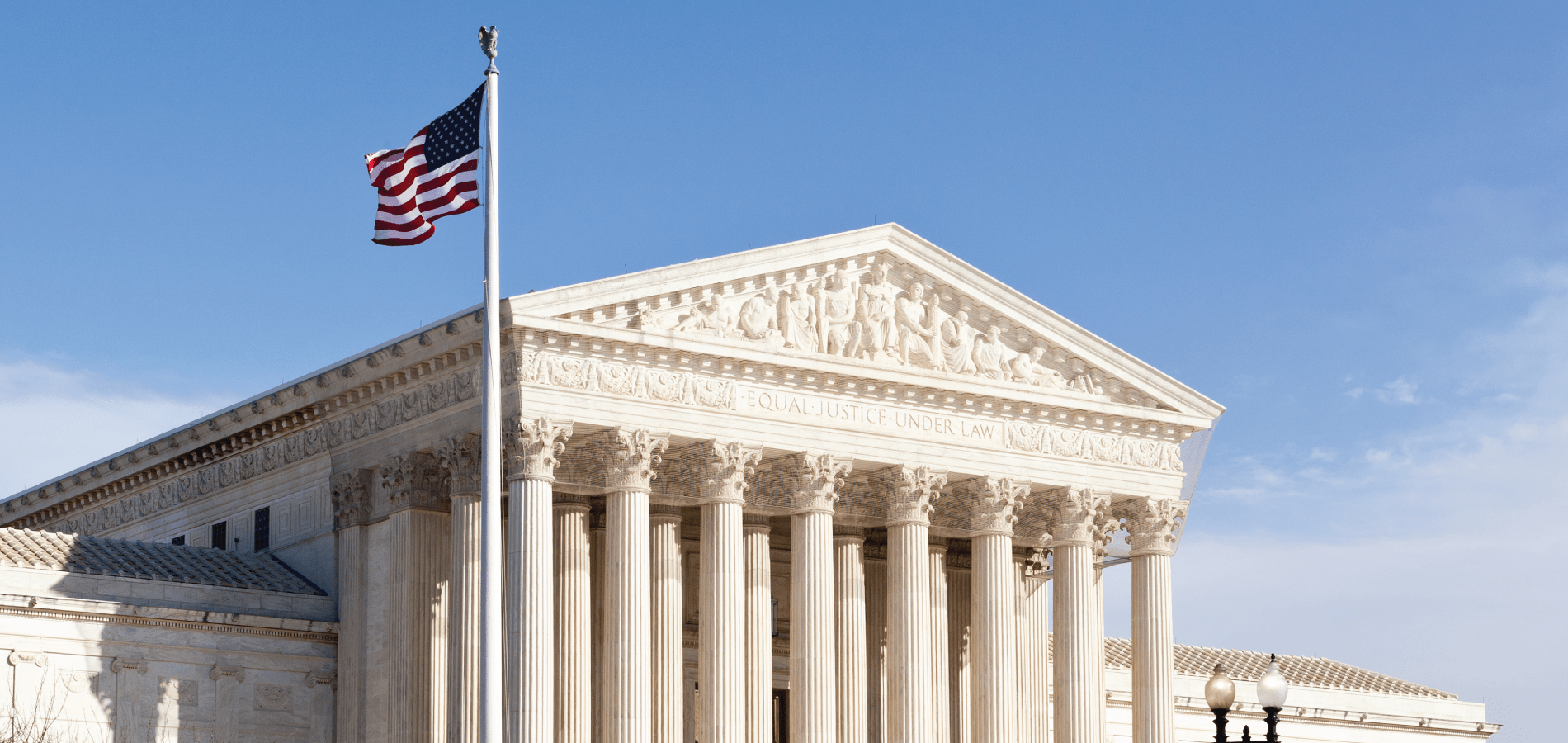On the first day of Christmas, my true love gave to me…a fine for losing the receipt for the Christmas tree strapped on the roof of my car? Well, that would be the case if you live in Michigan. The holiday season is chockful of some strange laws, some of which were lifted years ago, but many of which are still in force. So, if you don’t want to be spending your gift money on fines or your cookie-baking time in jail, you might want to pay attention to the following laws that govern the holiday season.
1. No Christmases Allowed in England
Under England’s Puritan movement during the 1500s, many began to see the frivolous celebration of Christmas as a distraction from Christian beliefs and values—in fact, pamphleteer Philip Stubbs said that these celebrations were “the great dishonour of God.” A 1647 ordinance stated that feasts were to be banned[1]C. H. Firth, Editor; Rait, R. S., Editor. Acts and Ordinances of the Interregnum, 1642-1660 (1911). This document can be found in HeinOnline’s Seldon Society Publications and the History of Early English Law database. on Christmas, Easter, and Whitsun. The Christmas ban lasted until it was lifted during the Restoration in 1660.
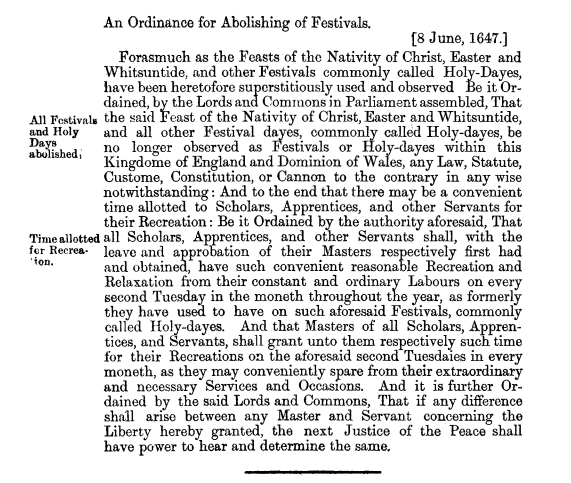
2. No Christmas in Massachusetts Bay Colony, Either
The Massachusetts Bay Colony implemented their own Christmas ban in the 1650s. Mainly consisting of Puritans, the colonists decided to ban any disorderly behavior that would be “to the great dishonour of God and offence of others”[2]Charters and General Laws of the Colony and Province of Massachusetts Bay (1814). This document can be found in HeinOnline’s Legal Classics database. during this holiday, at the risk of a five-shilling fine. While the ban was lifted in 1681, Christmas wasn’t actually listed as a public holiday in Massachusetts until 1856.[3]Massachusetts – Acts & Resolves, January Session 57. This document can be found in HeinOnline’s Session Laws Library.
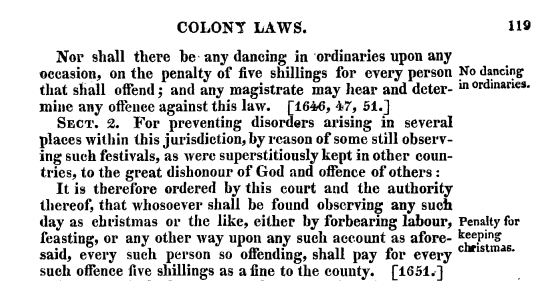
3. No Debts on Christmas
Louisiana passed a law in 1837 that forbade debts be due on Christmas, as a day of “public rest”[4]‘Louisiana – 13th Legislature, 2nd Session 44. This document can be found in HeinOnline’s Session Laws Library.—instead, the due date was to be moved to the 26th of December. Similarly, Arkansas also passed a law[5]Arkansas – General Assembly, 2nd Session 1. This document can be found in HeinOnline’s Session Laws Library. banning debt payments on Christmas, but you would have one less day to cough up the money, as any Christmas due dates were pushed back to Christmas Eve.
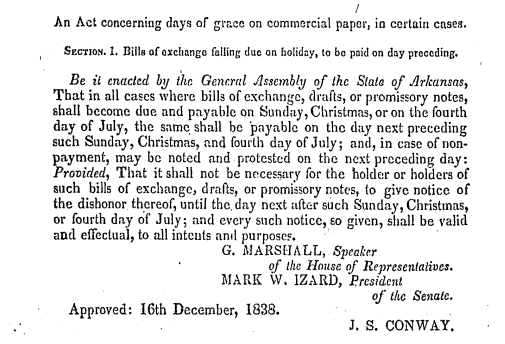
4. Respect the Reindeer on Christmas
You better not try to hunt Santa’s reindeer if you live in the United Kingdom. The 1831 Game Act[6]Richard Burn. Burn’s Justice of the Peace and Parish Officer: Containing the Cases & Statutes to 7 & 8 Vict., Inclusive, with a New Collection of Precedents (29). This document can be found in HeinOnline’s … Continue reading made it an offense to “…kill or take any game, or use any dog, gun, net or other engine or instrument for the purpose of killing or taking any game, on a Sunday or Christmas Day.” The law continues to this day.

5. Fake Trees Only
New York is the city that never sleeps…and it’s also the city where you’ll never see a real tree in a store, because the law designates it as a fire hazard. Same goes for apartment building common areas, and some renters got pretty angry a couple of years ago when the New York Fire Department removed their trees from their lobbies. In Philadelphia, real trees are banned in high-rise buildings or any building that houses more than two families.
6. The Tree Tax
Speaking of Christmas trees, the United States in 2011 very briefly enacted a 15-cent tax on every sale of a real Christmas tree,[7]76 Fed. Reg. 69096 (2011), Tuesday, November 8, 2011, pages 69083 – 69599. This document can be found in HeinOnline’s Federal Register Library. for the purpose of funding a “national research and promotion program for Christmas trees” to “strengthen the position of fresh-cut Christmas trees in the marketplace and maintain and expand markets for Christmas trees within the United States.” Essentially, the fee, as it was called, was to fund a Christmas tree PR campaign. General uproar caused the Obama administration to quickly rescind the effort, and no one ended up being taxed.
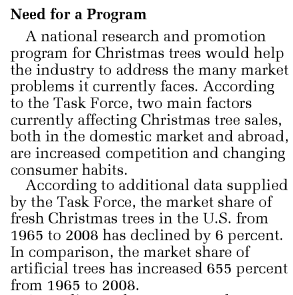
7. The Best Gift of All
The best things in life may be free, but let’s face it—we all need money, and cash is a pretty great gift. That’s why, in Mexico, there is a law that requires business to pay all of their employees a Christmas bonus, or an “aguinaldo,”[8]Complying with the Labor and Employment Laws of the NAFTA Countries, March 6-7, 2003, Coral Gables, Florida: ALI-ABA Course of Study Materials (2003). This document can be found in HeinOnline’s American Law Institute Library. by December 20th. The bonus must be the equivalent of 15 times the employee’s daily wage. Other countries requiring Christmas bonuses include Italy, France, Chile, and Brazil.

8. It’ll Be a Sober Christmas Without You
If you live in Arkansas, you’re going to want to stock up on the ingredients for your eggnog, Irish coffees, and Tom and Jerry’s before the actual holiday, because it is illegal to buy or sell alcohol on Christmas Day.[9]Arkansas – 57th General Assembly, Regular Session 815. This document can be found in HeinOnline’s Session Laws Library. Several other states also have rules in place regarding if/where you can buy alcohol on the holiday.
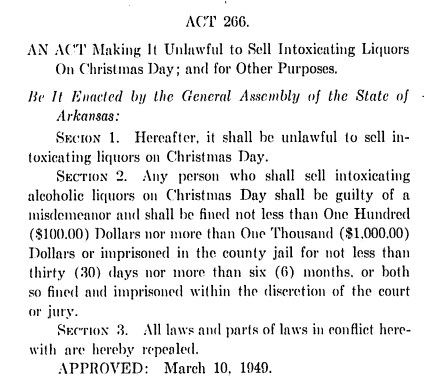
9. Keep Your Receipts
…especially after you buy a Christmas tree if you live in Michigan, because it is illegal to transport a tree back to your home if you don’t have proof of purchase.[10]Michigan – Public & Local Acts, Regular Session 153. This document can be found in HeinOnline’s Session Laws Library.
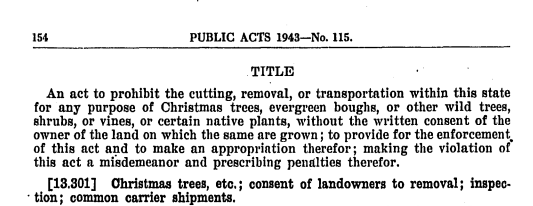
10. Turn Out the Lights
There’s nothing better than the warm, beautiful glow of Christmas lights, but after Christmas, it’s a different story. Several locations have rules about when you need to have your lights stored away by. For example, in San Diego, you’ll be fined after February 2. In Maine, it is rumored that you will be fined if you don’t have your lights down by January 14—however, the rumor likely comes from some town ordinances that once existed in the state.
11. The Three Reindeer Rule
The U.S. Supreme Court case Lynch v. Donnelly[11]Lynch, Mayor of Pawtucket, et al. v. Donnelly et al. , 465 U.S. 668, 727 (1984). This case can be found in HeinOnline’s U.S. Supreme Court Library. established what is often satirically referred to as the “Three Reindeer Rule,” because it ruled that any religious holiday display on government property needed to also include secular elements. For example, if you want to show a manger, might want to look at putting up elves. Or, if you have a baby Jesus, you might want to throw Santa in the mix, too. Three wise men? Three reindeer. Got it? If you don’t, we have a whole blog post on this case.
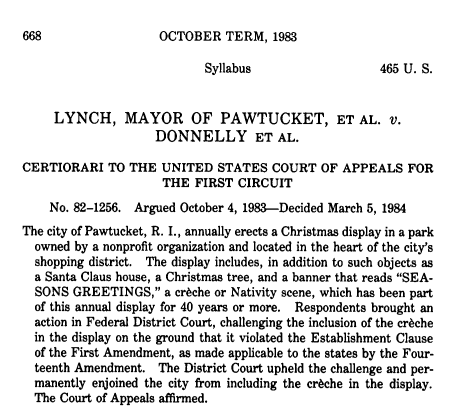
12. S-NO-wballs in Utah
In one town in Utah, Provo, it is a misdemeanor to throw snowballs at people or property. So, that scene in Elf where Buddy launches a devastating snowball attack on Michael’s bullies in Central Park? Could never have happened in Provo, Utah. Or, at least, Buddy might have served some jailtime.
Have Yourself a Merry Little Research Session
When it comes to your holiday research projects, you don’t need to wait for Santa—the HeinOnline elves are busy all year long adding a massive variety of government documents, multidisciplinary journals, international content, case law, and more into our databases for you to peruse and explore. Looking for a way to treat yourself to a little holiday gift? Subscribe to our blog, so you can receive posts like this directly in your inbox. Unlike “Last Christmas” by Wham!, or “All I Want for Christmas Is You” by Mariah Carey, you won’t get sick of the HeinOnline Bloggers by the time January comes around. Happy holidays! ❄️
HeinOnline Sources[+]
| ↑1 | C. H. Firth, Editor; Rait, R. S., Editor. Acts and Ordinances of the Interregnum, 1642-1660 (1911). This document can be found in HeinOnline’s Seldon Society Publications and the History of Early English Law database. |
|---|---|
| ↑2 | Charters and General Laws of the Colony and Province of Massachusetts Bay (1814). This document can be found in HeinOnline’s Legal Classics database. |
| ↑3 | Massachusetts – Acts & Resolves, January Session 57. This document can be found in HeinOnline’s Session Laws Library. |
| ↑4 | ‘Louisiana – 13th Legislature, 2nd Session 44. This document can be found in HeinOnline’s Session Laws Library. |
| ↑5 | Arkansas – General Assembly, 2nd Session 1. This document can be found in HeinOnline’s Session Laws Library. |
| ↑6 | Richard Burn. Burn’s Justice of the Peace and Parish Officer: Containing the Cases & Statutes to 7 & 8 Vict., Inclusive, with a New Collection of Precedents (29). This document can be found in HeinOnline’s Seldon Society Publications and the History of Early English Law database. |
| ↑7 | 76 Fed. Reg. 69096 (2011), Tuesday, November 8, 2011, pages 69083 – 69599. This document can be found in HeinOnline’s Federal Register Library. |
| ↑8 | Complying with the Labor and Employment Laws of the NAFTA Countries, March 6-7, 2003, Coral Gables, Florida: ALI-ABA Course of Study Materials (2003). This document can be found in HeinOnline’s American Law Institute Library. |
| ↑9 | Arkansas – 57th General Assembly, Regular Session 815. This document can be found in HeinOnline’s Session Laws Library. |
| ↑10 | Michigan – Public & Local Acts, Regular Session 153. This document can be found in HeinOnline’s Session Laws Library. |
| ↑11 | Lynch, Mayor of Pawtucket, et al. v. Donnelly et al. , 465 U.S. 668, 727 (1984). This case can be found in HeinOnline’s U.S. Supreme Court Library. |


